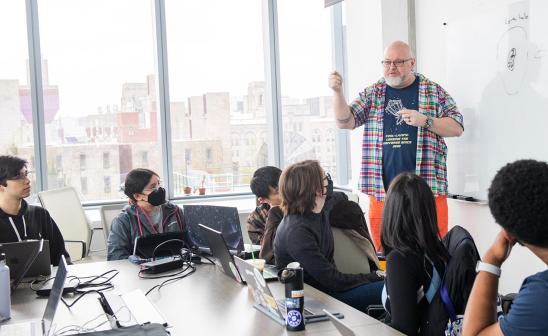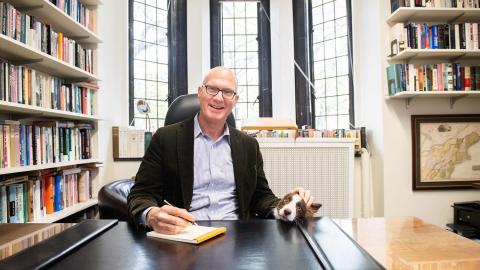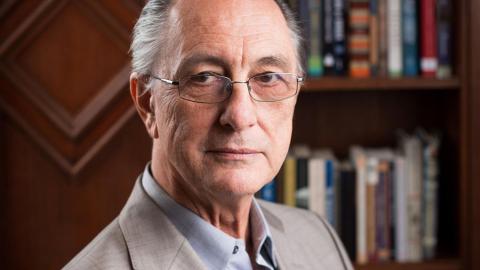UChicago announces 2023 winners of Quantrell and Graduate Teaching Awards

This article was originally published by UChicago News. We've highlighted the awardees from the Division of the Social Sciences, but you can view the full list here.
The transformative education offered at the University of Chicago begins with the faculty who inspire, engage and inform the students they teach.
The University annually recognizes faculty for their incredible teaching and mentoring of undergraduate and graduate students through the Llewellyn John and Harriet Manchester Quantrell Awards, believed to be the nation’s oldest prize for undergraduate teaching, and the Faculty Awards for Excellence in Graduate Teaching and Mentoring, which honor faculty for their work with graduate students.
Quantrell Awards: Leora Auslander, Michael Gladders, Robert L. Kendrick, Phoebe Rice, James Sparrow
Graduate Teaching and Mentoring Awards: Elisabeth Clemens, Paola Iovene, Katherine Kinzler, Bozhi Tian, David Wellbery
Llewellyn John and Harriet Manchester Quantrell Awards
Leora Auslander, the Arthur and Joann Rasmussen Professor in the Departments of Race, Diaspora, and Indigeneity and History
Prof. Leora Auslander works on how abstractions like “nationality,” “class,” “gender,” and “race,” are made and transformed in the things and spaces we use every day. She shows how the smallest differences—in style, in food, in manners—can lead to inclusion, exclusion and sometimes violence.
This awareness manifests in her teaching style, one that makes sure differences are respected and that listening, as well as speaking, is taken seriously.
“How do you create a classroom community where everybody exchanges their points of view and learns from each other?” Auslander asked. “Part of my job is to teach people how to do that. There's no reason to assume that when students walk into a classroom, they have any idea how to actually learn from each other.”
This past Winter Quarter, Auslander taught an Urban Studies course in Paris. One class was held in the Palais de la Porte Dorée, an art deco building erected for the 1931 Colonial Exposition that was decorated with stereotypical images of colonized subjects.
The building is a source of ongoing debate in France. Should it be destroyed? Preserved or perhaps recontextualized? Auslander posed the same questions to her class.
“We had a discussion for about an hour where all those positions were represented,” Auslander said. “The debate was vigorous, it was engaged, it was utterly respectful.”
“It was everything that I expected college to be,” said one of the student nominators in the class. “I've never been in a class where people actually changed their opinions because of good-faith debate, but it happened in Professor Auslander's class.”
“I can confidently say that hers is the best course I've taken,” said another student. “It is instructors like her that made me excited to come to UChicago.”
James Sparrow, Associate Professor in the Department of History
Assoc. Prof. James Sparrow, who teaches courses in U.S. democracy and history, says there is something special about the students here.
“It really is true that our students are devoted to the life of the mind to a degree that other peer institutions cannot match. I am struck by the seriousness with which students approach their studies here, their awe-inspiring smarts, and the consistently high level of discourse they are able to sustain in classroom discussion,” he said.
Sparrow said he likes to try to get students to bring together primary documents and historical interpretation, historical evidence and theory or philosophical questions when they encounter the past in his classroom.
In most classes, he also makes a concerted effort to model historical thinking by getting students to pose their own historical questions. Discussion is central to most of his teaching, as it is in much of the UChicago curriculum, he noted.
What he hopes to leave students with is a sense of the distance they have covered in transcending the received opinions that many have of the American past.
“Historical insight is hard-won, often personal, yet it opens out onto public questions of great importance whose answers transcend mere opinion, theoretical formula or mechanical solution. In an age of machine learning and artificial intelligence, the kind of judgment it cultivates remains a distinctive foundation for human intelligence.”
He said he advises incoming students not to be timid or cautious in their course selections.
“Now is the time to go for it. Disrupting your settled views is necessary to open up new avenues for personal and intellectual growth. Disciplinary skills are necessary, but they are wasted in the absence of informed and expansive curiosity, disciplined imagination and wide-ranging knowledge. Finally, seek out discomfort in coursework and experiences that constructively challenge your assumptions and abilities.
“The whole university is at your feet; carpe diem!”
Faculty Awards for Excellence in Graduate Teaching and Mentoring
Elisabeth Clemens, the William Rainey Harper Distinguished Service Professor in the Department of Sociology
Prof. Elisabeth Clemens encourages her students to follow their passion for a topic, even if no one else seems interested. “I often study the seemingly boring, because boring is a technique of power,” said the political sociologist. “If we unpack it, we see how the system works.”
But along with passion, must come relevance. “Ultimately, we're not writing and teaching just for ourselves,” said Clemens, who recently received the Laing Award for her book “Civic Gifts,” which looks at how philanthropy has shaped U.S. history.
Clemens knows the potential pitfalls graduate students face navigating the academic world. That’s why she spends so much time helping her students avoid them—especially when choosing a research project.
“I really push hard to clarify: Why are you interested in this? Will you still be interested in this five or 10 years from now?” Clemens said.
“Lis’s magic is that she not only pushes her students to be as ambitious as possible in their research, she also helps them deal with the practicalities of carrying out that research,” said one advisee.
This signature blend of practicality, passion and rigor has made Clemens one of the most sought-after thesis advisors in sociology. Despite the large number of dissertation committees she sits on, Clemens always makes time for her students—to prod at their arguments and keep their projects on track for graduation and beyond.
“Lis was there at every crucial moment of my Ph.D., pushing me to be a better scholar and teaching me how to become a successful academic,” the mentee wrote. “These, of course, are related but distinct.”
Clemens hopes her students, many of whom have gone on to tenure-track positions, value what they’ve learned and connections they’ve made regardless of whether they choose to stay in academia. “We want more people throughout all parts of life who bring a rigorous and creative social science perspective on the problems of the world.”
Katherine Kinzler, Professor in the Department of Psychology
Prof. Katherine Kinzler studies how language shapes our social identities—including our judgments of each other. But in her lab, Kinzler encourages her students to talk to each other as much as possible. For her, this collaborative approach—“growing the pie”—creates enough resources so that everyone gets a piece.
As a graduate student, Kinzler met Kristin Shutts, now a psychology professor at the University of Wisconsin-Madison and current visiting scholar at UChicago. “It really benefited me and Kristin, as young scientists, that we shared the joys of research,” Kinzler said. “We were able to create more than either one of us could have done by ourselves.”
The longtime friends and colleagues even co-authored an article about ways to promote collaboration in the lab.
“When you come into grad school, these are the people who are going to be your colleagues,” said Kinzler, who also serves as chair of the Department of Psychology. “So, encouraging those strong relationships among junior scholars is really important.”
“Dr. Kinzler is an incredibly generous research mentor,” said one mentee who merged research projects with another graduate student at Kinzler’s suggestion. “She consistently gave her time to hear out my ideas and connected me with people who might support those ideas.”
Another advisee noted that Kinzler was “an advocate and changemaker” for graduate students. “She regularly helped me feel autonomous and capable while steering me towards tractable high-impact projects,” said another mentee.
Kinzler encourages young scholars to also think about the broader impact of their research. Her recent book, “How You Say It: Why We Judge Others by the Way They Talk—and the Costs of This Hidden Bias,” highlights findings from several former students and is written for a general audience. “I'm continually learning and growing from the contributions of my graduate students. And for them, I think having somebody who supports them as a person, and not just as a scientist, can really make a big difference.”
David Wellbery, the LeRoy T. and Margaret Deffenbaugh Carlson University Professor in the Department of Germanic Studies and the John U. Nef Committee on Social Thought
Prof. David Wellbery believes that the best moments in class occur when the lecture or discussion brings everyone to the brink of a transformative insight.
“In my seminar on Faust II, we were discussing the final act when I suddenly realized – and the class came to see it with me – that the final act is not one act, but rather three units: a final act of five scenes, then a satyr play (in the tradition of ancient Greek drama), then a choral piece that is no longer drama, but spiritual vision. Seeing that arrangement makes a huge difference in interpreting the work overall.”
Wellbery is teaching a graduate course (with some undergraduate attendance) on Thomas Mann's 1948 novel, “Dr. Faustus.”
When he wrote the novel, Mann was living in California and he had become an American citizen, so Wellbery says there's an argument to be made that it is the greatest “American” novel of the 20th century. The novel is exemplary both for the depth of its moral issues and for its aesthetic intricacy, he said.
It is perhaps the greatest 20th-century rendering of the Faust myth, which reaches back to the 16th century and has in Goethe's two-part ‘Faust’ play (1832) its most important predecessor, he said. Teaching Mann's novel, he argues, affords students access to a major work of modern literature, but also opens a view onto the rich literary, musical and artistic tradition that has grown up around the Faust myth.
Wellbery arrived at his central research interest in Goethe from a lecture on a famous poem by Goethe that he attended while in graduate school. “As it turned out, I vigorously disagreed with the lecturer's interpretation and that disagreement demonstrated to me that, despite the wealth of research on Goethe, I myself had something to say. I later wrote a book about the poem.”
In the nomination letters in support of Prof. Wellbery’s award, many wrote about his wisdom, kindness and support. “I would like to emphasize how much Professor Wellbery genuinely cares about his graduate students,” one noted. “Meetings about my dissertation always included check-ins on my well-being and the general state of graduate student culture in the Department. He encouraged us to rely on each other and lift each other up, while always offering his own support as well.”
Compiled by Andy Brown, Tori Lee, Louise Lerner, Sara Patterson, Emily Rosenbaum and Matt Wood.
 THE UNIVERSITY OF CHICAGO
THE UNIVERSITY OF CHICAGO



